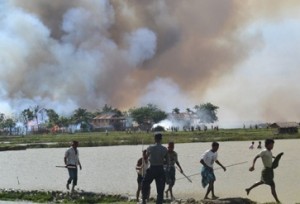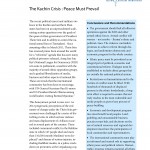Posts Tagged ‘Arakan/Rakhine’ (131 found)
UN Expert Urges Myanmar to Act on Local Regulations Targeting Rohingya Muslims in Rakhine State
Myanmar must respond unambiguously to the revival of a local order limiting the number of children that Rohingya Muslims can have to two, or face fines and prison sentences under section 188 of the Myanmar Penal Code. The call comes from the UN Special Rapporteur on the human rights situation in Myanmar, Tomás Ojea Quintana […]
• • •Burma: Revoke ‘Two-Child Policy’ For Rohingya
Burma’s government should publicly revoke a discriminatory population control regulation that restricts Rohingya Muslims to having two children. Implementation of this policy is consistent with the wider persecution of the largely stateless Rohingya, violating international human rights protections, and endangering women’s physical and mental health […]
• • •Two-Child Policy in Arakan State: Latest Act of Ill-treatment, Unlikely to be the Last
 Last week, Arakan State officials, following recommendations from the internationally-rejected 186-page report of a government-appointed commission, announced a mandatory two-child policy to ‘help ease tension’ in Buthidaung and Maungdaw provinces where the majority of the population is Muslim. A year after two bouts of violence in Arakan State, this two child policy, that applies predominantly to the Rohingya population, is perhaps the most obvious outline of potential ethnic cleansing that many have voiced their concerns about, most noticeably in the last Human Rights Watch report. “The state government is trying to use the Rakhine investigation recommendation, which is outrageous, to justify a policy of limiting births of Rohingya,” said Phil Robertson, Asia deputy director of Human Rights Watch.
Last week, Arakan State officials, following recommendations from the internationally-rejected 186-page report of a government-appointed commission, announced a mandatory two-child policy to ‘help ease tension’ in Buthidaung and Maungdaw provinces where the majority of the population is Muslim. A year after two bouts of violence in Arakan State, this two child policy, that applies predominantly to the Rohingya population, is perhaps the most obvious outline of potential ethnic cleansing that many have voiced their concerns about, most noticeably in the last Human Rights Watch report. “The state government is trying to use the Rakhine investigation recommendation, which is outrageous, to justify a policy of limiting births of Rohingya,” said Phil Robertson, Asia deputy director of Human Rights Watch.
This policy announcement also marks the government’s first ‘official’ act of segregation since the outbreaks of violence that displaced as many as 125,000 Rohingya. From burning of mosques, targeted attacks on Rohingya families, denial of identity, and the implicit support of the 969 anti-Muslim campaign, now comes population control. It is unlikely to stop. This time it’s clearer than ever that the government is backing the agenda behind a campaign against the Muslims in Burma. Win Myaing, a Rakine State spokesperson said that the Rohingya population in the area is growing ten times faster than the Buddhist Arakanese and is one of the causes of the tension. Although population pressure on scarce socio-economic resources in the area should be taken into consideration, this policy serves only one purpose – defeat of the ‘unwanted’ Rohingya population […]
Myanmar: Official Report On Rakhine State Conflict Flawed
Following the communal violence that wracked the western parts of Myanmar near the border of Bangladesh in 2012, the country’s president established a commission of inquiry comprising of retired public servants, religious figures, politicians, academics and members of civil society. The commission handed down its findings on 22 April 2013. Despite high expectations, the 119-page report is gravely flawed […]
• • •Myanmar Must Avert Further Humanitarian Disaster as Cyclone Approaches
Heavy monsoon rains and a tropical cyclone threaten the lives of tens of thousands of displaced persons in western Myanmar unless the authorities immediately step up efforts to protect them, Amnesty International said. More than 140,000 individuals – mostly from the Rohingya Muslim minority […]
• • •Myanmar Lowest Ranking Nation in Resource Governance: Revenue Watch Institute
Myanmar was given the lowest resource governance ranking in the world according to a new index, released by the Revenue Watch Institute. The Shwe Gas Movement, which monitors Burmese natural resources, stated the result shows it is premature to invest in the resource rich […]
• • •Action Needed On Humanitarian Aid Restrictions In Burma
As Cyclone Mahasen threatens millions of people in Bangladesh and Burma, including tens of thousands of internally displaced people (IDPs) in Rakhine State, Burma Campaign UK today called on the British government and international community to take action to force President Thein Sein to allow unrestricted humanitarian aid […]
• • •Burma: Cyclone Threatens Displaced Muslims
Burma’s government should take immediate action to evacuate to higher ground tens of thousands of Muslims displaced last year by ethnic cleansing in Arakan State in advance of a tropical cyclone in the Bay of Bengal, Human Rights Watch said today. Half of the approximately 140,000 ethnic Rohingya and Kaman Muslims displaced […]
• • •The Kachin Crisis: Peace Must Prevail
 The recent political unrest and military violence in the Kachin and northern Shan states has been on an unprecedented scale, raising serious questions over the goals of the quasi-civilian government of President Thein Sein and its ability to control the national armed forces (Tatmadaw). Since assuming office in March 2011, Thein Sein has received praise from around the world for a “reformist” agenda that has seen many political prisoners released, Aung San Suu Kyi’s National League for Democracy (NLD) win seats to parliament, ceasefires with the majority of armed ethnic opposition groups, and a gradual liberalisation of media, business and other aspects of national life. These are trends that the international community has been keen to encourage, with UN General-Secretary Ban Ki-moon and US President Barack Obama among world leaders visiting Burma/Myanmar […]
The recent political unrest and military violence in the Kachin and northern Shan states has been on an unprecedented scale, raising serious questions over the goals of the quasi-civilian government of President Thein Sein and its ability to control the national armed forces (Tatmadaw). Since assuming office in March 2011, Thein Sein has received praise from around the world for a “reformist” agenda that has seen many political prisoners released, Aung San Suu Kyi’s National League for Democracy (NLD) win seats to parliament, ceasefires with the majority of armed ethnic opposition groups, and a gradual liberalisation of media, business and other aspects of national life. These are trends that the international community has been keen to encourage, with UN General-Secretary Ban Ki-moon and US President Barack Obama among world leaders visiting Burma/Myanmar […]
BROUK Welcomes Statement of Tomás Ojea Quintana and Urges International Community to Take Immediate Action
On 16 February 2013, following a five-day mission to Burma, UN Special Rapporteur on Human Rights Tomás Ojea Quintana expressed his concern about the “profound crisis” in Arakan state. He highlighted the lack of adequate health care in the larger Rohingya Muslim […]
• • •








 All posts
All posts